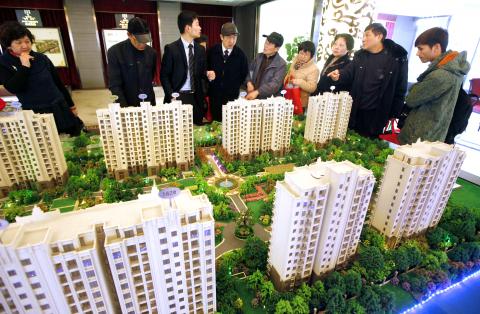China’s new house prices posted the broadest advance since December 2011, a test for new Chinese Premier Li Keqiang (李克強) as he seeks to prevent a bubble without damping economic growth.
Prices climbed in 62 cities of the 70 the government tracks last month from a year earlier, China’s National Bureau of Statistics said yesterday.
Beijing prices jumped 5.9 percent from a year earlier, the biggest since February 2011, while they advanced 8.1 percent in Guangzhou, the most since January 2011.

Photo: Reuters
China on March 1 imposed its toughest curbs in a year, ordering the central bank to raise down-payment requirements and interest rates for second mortgages in cities with excessive price gains, enforcing a property sales tax and telling local governments with the biggest price pressures to tighten property purchase limits.
It ordered individuals selling properties to pay a 20 percent tax on the sale profit when the original purchase price is available, a levy that is being easily avoided.
“We are expecting more property policies in the next couple of months including those issued by local governments, because fast-rising house prices have put the government under a lot of pressure,” said Ding Shuang (丁爽), a senior China economist with Citigroup Inc in Hong Kong. “It’s not only a big challenge for the new administration, but also shows that previous curbs have not worked.”
The Shanghai Stock Exchange Property Index, which tracks 24 developers, declined 1.4 percent to the lowest since Dec. 7 last year at the close of trading.
The southern cities of Guangzhou and Shenzhen were among major cities that led gains last month from a year earlier.
Prices in Shenzhen advanced 5.7 percent. The special economic zone that borders Hong Kong said last week it is taking steps to guide developers in setting reasonable prices and is implementing the central government’s measures to ensure prices do not rise too quickly.
The biggest decline in new house prices last month was in Wenzhou, where they tumbled 10.1 percent from a year earlier.
Existing house prices rose 6 percent in Beijing last month from 12 months ago and increased 3.9 percent in Shanghai, according to the data. They climbed 5.7 percent in Guangzhou and 3.9 percent in Shenzhen.
Former Chinese premier Wen Jiabao (溫家寶), who was succeeded by Li on Friday, had vowed to keep housing affordable and taken multiple measures.
During his tenure, Wen raised down-payment and mortgage requirements, imposed a property tax for the first time in Shanghai and Chongqing, and enacted home-purchase restrictions in about 40 cities.
Local governments must respond to the central government’s March 1 policies, including price control targets, by the end of the month.
Private data also has shown increases in prices. House prices rose for nine straight months, increasing 0.8 percent last month, according to SouFun Holdings Ltd (搜房控股), the country’s biggest real estate Web site owner.
China’s property prices will “definitely” decline this year, Shanghai Securities News reported on Thursday, citing Chinese Housing Minister Jiang Weixin (姜偉新).

MULTIFACETED: A task force has analyzed possible scenarios and created responses to assist domestic industries in dealing with US tariffs, the economics minister said The Executive Yuan is tomorrow to announce countermeasures to US President Donald Trump’s planned reciprocal tariffs, although the details of the plan would not be made public until Monday next week, Minister of Economic Affairs J.W. Kuo (郭智輝) said yesterday. The Cabinet established an economic and trade task force in November last year to deal with US trade and tariff related issues, Kuo told reporters outside the legislature in Taipei. The task force has been analyzing and evaluating all kinds of scenarios to identify suitable responses and determine how best to assist domestic industries in managing the effects of Trump’s tariffs, he

TIGHT-LIPPED: UMC said it had no merger plans at the moment, after Nikkei Asia reported that the firm and GlobalFoundries were considering restarting merger talks United Microelectronics Corp (UMC, 聯電), the world’s No. 4 contract chipmaker, yesterday launched a new US$5 billion 12-inch chip factory in Singapore as part of its latest effort to diversify its manufacturing footprint amid growing geopolitical risks. The new factory, adjacent to UMC’s existing Singapore fab in the Pasir Res Wafer Fab Park, is scheduled to enter volume production next year, utilizing mature 22-nanometer and 28-nanometer process technologies, UMC said in a statement. The company plans to invest US$5 billion during the first phase of the new fab, which would have an installed capacity of 30,000 12-inch wafers per month, it said. The

Taiwan’s official purchasing managers’ index (PMI) last month rose 0.2 percentage points to 54.2, in a second consecutive month of expansion, thanks to front-loading demand intended to avoid potential US tariff hikes, the Chung-Hua Institution for Economic Research (CIER, 中華經濟研究院) said yesterday. While short-term demand appeared robust, uncertainties rose due to US President Donald Trump’s unpredictable trade policy, CIER president Lien Hsien-ming (連賢明) told a news conference in Taipei. Taiwan’s economy this year would be characterized by high-level fluctuations and the volatility would be wilder than most expect, Lien said Demand for electronics, particularly semiconductors, continues to benefit from US technology giants’ effort

‘SWASTICAR’: Tesla CEO Elon Musk’s close association with Donald Trump has prompted opponents to brand him a ‘Nazi’ and resulted in a dramatic drop in sales Demonstrators descended on Tesla Inc dealerships across the US, and in Europe and Canada on Saturday to protest company chief Elon Musk, who has amassed extraordinary power as a top adviser to US President Donald Trump. Waving signs with messages such as “Musk is stealing our money” and “Reclaim our country,” the protests largely took place peacefully following fiery episodes of vandalism on Tesla vehicles, dealerships and other facilities in recent weeks that US officials have denounced as terrorism. Hundreds rallied on Saturday outside the Tesla dealership in Manhattan. Some blasted Musk, the world’s richest man, while others demanded the shuttering of his